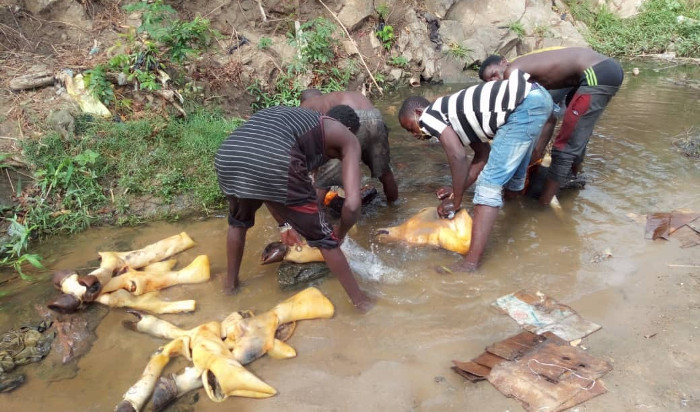
Some butchers in the Federal Capital Territory (FCT) have called on the FCT Minister Mohammed Bello to intervene over lack of basic amenities in abattoirs across the territory.
The butchers, who spoke to the News Agency of Nigeria (NAN) in Kuje, Deidei and Dutse on Thursday decried the poor attention given to abattoirs in the territory.
NAN visits to some of the abattoirs indicates that the butchers operate without water, electricity and good roads as they were seen washing roasted meats in streams.
Alhaji Bala Ismaila, the Head of Butchers of Kuje Abattoir, told NAN that lack of water and the deplorable state of the road to the abattoir had been of serious concern to the butchers.
He said the dilapidated state of the slaughterhouse and the difficulties of conveying meat to the market had been a threat to meat business in the area.
Ismaila said that butchers had resorted to slaughtering of cows in open spaces because of lack of water and the deplorable state of the slaughterhouse.
We have been trying to discourage meat consumers from coming to the abattoir because most of them will be discouraged from patronising us after seeing our operating environment.
Presently, we are slaughtering cows in an open environment instead of using the slaughterhouse because there is no water in the abattoir for over four years.
The most unhygienic part of it is that we have been using stream water to wash roasted meat as you can see the environment, people defecate and throw it inside the stream but we have no option.
We are appealing to the relevant authorities, especially the FCT Minister and the Chairman of Kuje Area Council to come to the aid of the butchers in the interest of meat consumers, he said.
Mr Salisu Ahmed, a butcher in Kuje Abattoir, said that the slaughterhouse was built over 25 years ago by Alhaji Jibrin Wowo-led administration of the council.
Ahmed said that Mr Danladi Zhin-led administration sunk borehole and connected water to the slaughter house over six years ago.
The borehole was vandalised shortly after its inauguration and since then, we have been operating without good source of water despite efforts to get the attention of the Area Council.

Successive administrations of the council since 2012 have not shown interest in providing basic amenities in the abattoir and yet we pay N500 as revenue to the Area Council for each cow slaughtered.
So there is no reason why the Area Council should not provide the needed amenities in the abattoir, he said.
At the Deidei abattoir, butchers lamented the deplorable state of market and the road linking the abattoir.
Malam Sada Muhammad, Head of Butcher of the Deidei Abattoir, said that members and traders in the market suffered losses due to lack of water, electricity and bad road.
Muhammad said that traders and butchers suffer more during the raining season because of the difficulties in gaining entrance into the market.
He said except urgent steps are taken to rehabilitate the road and provide basic amenities in the abattoir, the suffering of the butchers and meat consumers would continue.
He, therefore, appealed to the authorities of FCT and Abuja Municipal Area Council to come to the aid of butchers and meat consumers in the area.
Malam Shehu Abubakar, the Chairman of Deidei Market Association, said that the challenge of providing basic amenities in markets and abattoirs was not peculiar to Deidei market.
He said that most markets and abattoirs in the FCT were facing similar problems but appealed to relevant authorities to find lasting solution to them.
This is my 42 years in meat business. I have been to some markets and abattoirs and I can tell you that they all have similar problems.
The problem all over is the problem of water to clean slabs after slaughtering and this has been a major challenge to butchers because of smell and difficulty in managing the slaughterhouses without water.
Since there is no water in the abattoir, we sometimes go to the river behind to slaughter the cow and use the flowing water to wash the meat.
We know that the water we are using is not very clean but we are using it because there is no option, he said.
Abubakar said an average of 300 cows and 3,000 goats were slaughtered daily and for the pay revenue of N2,000 and N200 per cow and goat.
He said that part of the N2,000 revenue was given to AMAC, another part to police for security while the remaining part was used to take care of members.
We are appealing to the FCT Administration to come to our aid in the interest of the butchers and meat consumers.
Our major challenge now is the state of the road linking the abattoir because the culvert on the road is in a deplorable state and can cut off anytime.
Our appeal is for the relevant authorities to fix the road to ensure easy movement of goods and services, he said.
Malam Yisa Hassan, a butcher in Duste Cattle Market, said the market currently being used by the butchers was not legally allocated to them.
He called on the Bwari Area Council to provide a permanent market for the butchers.
Earlier, Mr Sani Mohammed, Head of Environment, Health and Sanitation Department, Kuje Area Council, said a committee had been set up to look into the challenges of butchers in the council.
Source: NAN